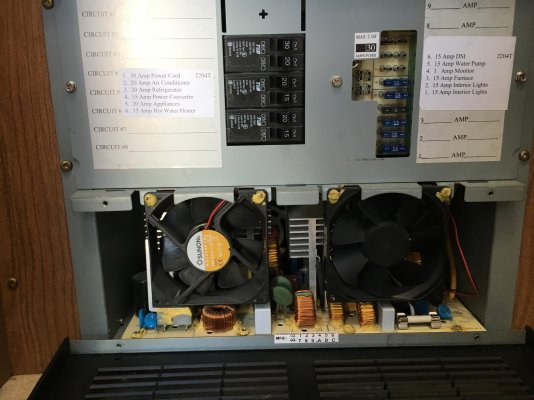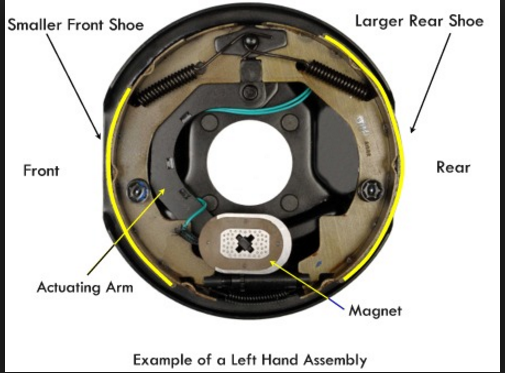I don't understand what is wrong. I replaced the battery with a 27 series after thinking that the battery was bad. I have double checked to insure that I didn't leave the switch on. I checked and my meter only showed .56 volts last night. So I plugged in to power last night, and this morning it meter reads .26. There has to be a direct short somewhere. Any suggestions on where to start? We are schedule to leave on a long trip next week, so I'm stressing a lot!
You are using an out of date browser. It may not display this or other websites correctly.
You should upgrade or use an alternative browser.
You should upgrade or use an alternative browser.
The first thing I would check is the fridge turned on in the 12 volt mode. It pulls about 15 amps and drains a battery fairly quickly. Beyond that a possible short would be suspect. Is the fan running on the converter? It can run when the fridge is on 12 volts or if there is a heavy load on the battery of some sort. Have you tried charging the battery with an external charger? If the battery is good the charger should bring it back. There is the possibility that the battery is bad even thou it is new. Taking a battery to zero can also limit its life, never go below 12.5 volts(50%) before charging for maximum battery life. If you can get it back up take it to where you got it and have them test it.
Yes, that is the converter section at the bottom, if it is working you should see an increase in voltage at the battery when plugged into shore power. There is a fuse that protects the converter against reverse polarity.
Yes, that is the converter section at the bottom, if it is working you should see an increase in voltage at the battery when plugged into shore power. There is a fuse that protects the converter against reverse polarity.
Last edited:
The fridge is a 2-way, gas or A/C. It was turned to A/C, but that shouldn't draw power from the battery, should it. I have also noticed that the converter fans have come on when I wasn't connected to A/C. I just checked the battery with the meter, and it's up to 3.8 volts. Maybe I got a bad battery, and need to take it back to Sam's Club.
r67northern
Senior Member
I would think about the battery being bad as well. Have you tried to trickle charge it and just let it sit unplugged from everything to see what happens?
If it's a two way fridge, there is probably no connection to the battery. The fans running that the converter is producing a large amount of current. Try unplugging the shore power and see if there is a reduction in voltage at the battery, then plug in to see if the voltage increases. If that happens the converter is putting out. Do you have another battery you could connect to see what it does? If it is properly charged you should see maybe 12.6 to 12.7 volts. Hooked to the converter the voltage should go up to 13.6 volts as the battery charges. I'm thinking a battery test is in order.
I think I would pull EVERY fuse to disable all of the DC circuits and then see if your battery will accept and hold a charge. If it does, you could then reinsert the fuses one at a time until you locate the circuit that is establishing the constant draw. Once you find that, you should be able to isolate the component that is the culprit.
I wonder if the problem is in the converter itself? It doesn't sound like a "short" to me, though. Just something that is putting a constant current draw on the battery. It wouldn't have to be all that large, either.
- Jack
I wonder if the problem is in the converter itself? It doesn't sound like a "short" to me, though. Just something that is putting a constant current draw on the battery. It wouldn't have to be all that large, either.
- Jack
I think I would pull EVERY fuse to disable all of the DC circuits and then see if your battery will accept and hold a charge. If it does, you could then reinsert the fuses one at a time until you locate the circuit that is establishing the constant draw. Once you find that, you should be able to isolate the component that is the culprit.
I wonder if the problem is in the converter itself? It doesn't sound like a "short" to me, though. Just something that is putting a constant current draw on the battery. It wouldn't have to be all that large, either.
- Jack
I agree with Jack.
Doug Allen
Advanced Member
Hi PapaRoe,
Your 0.56 and 0.26 VDC readings makes me question your readings. Although a direct short could completely drain a battery, there probably would be fuse protection of any high current drain.
Here's what I would do. First, using your same meter in the DC position, check a known good battery such as the one in your truck and see if it reads around 12.5 V. Then retest your RV battery. If you find those same RV battery results, under 1 VDC, disconnect the battery from the cables that go to everything in the RV and check the resistance on those cables (black for ground and res for positive) with the master switch (next to the raise/lower switch probably) in the off position. I think you should measure an open circuit or very nearly- several thousand ohms or no reading. Can someone confirm this? Next I would turn on the master switch, but without any lights or appliances turned on, and see if the resistance changes. Each light or 12 V appliance you turn on should reduce the resistance reading. If, with the master switch in off position or in the on position and no lights or 12V appliances turned on, and you read a low resistance like 5, 10, or 20 ohms or lower, then something is drawing current, and I'd have to study your electric circuit to see what it could be, possibly the hydraulic lift motor or the converter circuit.
The suggestion to remove all the fuses and then replace them one by one to isolate the circuit with a short is a good one. Again, when you read low resistance it indicates a "load" which could be a shorted circuit. When your meter shows no indication of resistance or thousands of ohms, it indicates a open circuit (or nearly so).
Your 0.56 and 0.26 VDC readings makes me question your readings. Although a direct short could completely drain a battery, there probably would be fuse protection of any high current drain.
Here's what I would do. First, using your same meter in the DC position, check a known good battery such as the one in your truck and see if it reads around 12.5 V. Then retest your RV battery. If you find those same RV battery results, under 1 VDC, disconnect the battery from the cables that go to everything in the RV and check the resistance on those cables (black for ground and res for positive) with the master switch (next to the raise/lower switch probably) in the off position. I think you should measure an open circuit or very nearly- several thousand ohms or no reading. Can someone confirm this? Next I would turn on the master switch, but without any lights or appliances turned on, and see if the resistance changes. Each light or 12 V appliance you turn on should reduce the resistance reading. If, with the master switch in off position or in the on position and no lights or 12V appliances turned on, and you read a low resistance like 5, 10, or 20 ohms or lower, then something is drawing current, and I'd have to study your electric circuit to see what it could be, possibly the hydraulic lift motor or the converter circuit.
The suggestion to remove all the fuses and then replace them one by one to isolate the circuit with a short is a good one. Again, when you read low resistance it indicates a "load" which could be a shorted circuit. When your meter shows no indication of resistance or thousands of ohms, it indicates a open circuit (or nearly so).
I did check the battery on my truck this morning using the same meter on the same setting, and it read 12.7 volts. Then I checked the new 27 group that I installed on Saturday, and it was below 1 volt. I'm taking it to an highly recommended RV repair shop in the morning. I want this thing fixed now, and I'm getting ready to sell it after our trip.
Update
So I took the trailer into a shop to find the drain. He couldn't find anything wrong, and didn't charge me anything. He said that the "new" battery was low, and charged it a little, but those deep cycle batteries take a long time to charge. However, it had enough to to raise and lower without any problems. So I took it home and tried charging it. No luck. A trip back to Sam's Club, and they too, could not get the battery to take a charge. They tried two others and found that they were bad. Finally they found one that was good, so I came back home and installed it--all is good! The trailer is now ready for our big trip.
So I took the trailer into a shop to find the drain. He couldn't find anything wrong, and didn't charge me anything. He said that the "new" battery was low, and charged it a little, but those deep cycle batteries take a long time to charge. However, it had enough to to raise and lower without any problems. So I took it home and tried charging it. No luck. A trip back to Sam's Club, and they too, could not get the battery to take a charge. They tried two others and found that they were bad. Finally they found one that was good, so I came back home and installed it--all is good! The trailer is now ready for our big trip.
Last edited:
sam-HILO
Senior Member
Yes.finaly!!
Glad you got your problem resolved. It can be quite madening. New parts can be defective as you found out. Have a great trip.
Glad you got your problem resolved. It can be quite madening. New parts can be defective as you found out. Have a great trip.
One thing I just thought of that can be easily overlooked is the emergency breakaway switch. If it has been accidentally activated the draw on the battery can be quite large draining the battery and the power to it is not fused. One bad thing that can happen also is if the switch is activated and the brakes are energized for a long time the magnets can burn out.
Papa:
The magnets are in the hubs, and here's a picture of the general configuration:
There's a video of magnet replacement here:
https://www.etrailer.com/tv-demo_trailer_hub_magnet_replacement.aspx
Good luck.
The magnets are in the hubs, and here's a picture of the general configuration:
There's a video of magnet replacement here:
https://www.etrailer.com/tv-demo_trailer_hub_magnet_replacement.aspx
Good luck.
Attachments
Try RV LIFE Pro Free for 7 Days
- New Ad-Free experience on this RV LIFE Community.
- Plan the best RV Safe travel with RV LIFE Trip Wizard.
- Navigate with our RV Safe GPS mobile app.
- and much more...



